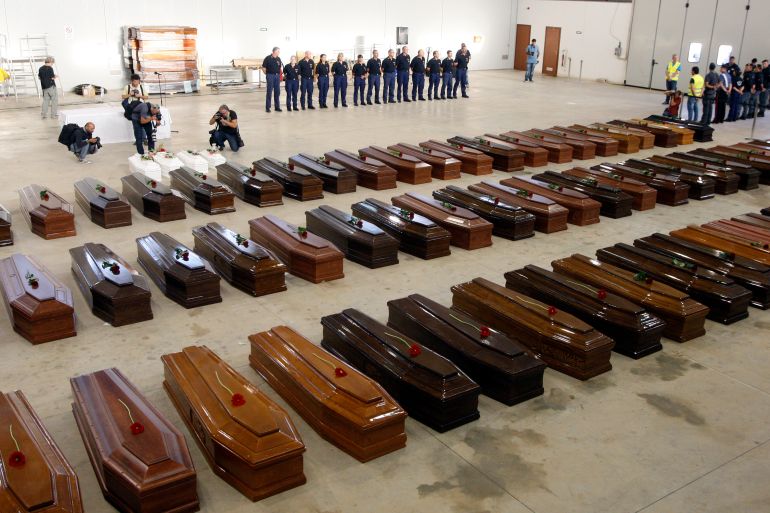Lampedusa’s tragedies remind us we need urgent action from the EU
People continue to die in the Mediterranean because we are yet to see a coordinated rescue effort and safe routes for migration.

On October 3, 2013, one of the Mediterranean’s worst shipwrecks occurred off the coast of the Italian island of Lampedusa. The vessel carrying almost 500 people, sank, resulting in the loss of at least 368 lives.
I was working in the humanitarian field in Rome at the time and was horrified to have something so tragic happen so close to home. I heard stories from colleagues about divers who were pulling victims out – body by body, day by day – lining them up on the harbour. I was heartbroken to see the photos of neatly arranged caskets in a warehouse; a few small white ones carrying the bodies of children were pulled up in the front.
Keep reading
list of 4 itemsBeyond borders: Migrants online
Tunis police raid sees refugees abandoned near the border with Algeria
‘No turning back’: Carnation Revolution divides Portugal again, 50 years on
It has been 10 years since this tragedy and the horrible memories of it still haunt Lampedusa. Unfortunately, not enough has been done to prevent such deadly incidents from happening again. More than 28,000 people have been reported dead or missing since 2014 in the Mediterranean Sea, more than 1,100 of them children.
A few weeks ahead of the anniversary, I found myself in Lampedusa. The island again was going through a difficult time. In a single week, it had seen the arrival of an estimated 10,000 people, a number which is nearly double its permanent population.
In all my years working for humanitarian organisations, I had never seen the island like this. The facilities set up to accommodate new arrivals were overwhelmed by lines of men, women and children, some of whom were forced to sleep outside in the streets. People wandered into town in search of food and water after spending days without eating.
Each individual arriving had a story marked by sacrifice and resilience. Many came with nothing, often carrying only a plastic bag with an object from a loved one or soil from their homeland. There were children who had experienced gender-based violence and mothers who had survived rape. There were people who had lost loved ones on the way.
Amid the pain and suffering of the people arriving by boat, one story of humanity stood out for me. An 18-year-old young man from West Africa had just arrived with a three-year-old child. They weren’t relatives; he had discovered the child alone in the desert and protected him throughout their perilous journey across the Mediterranean.
The child is receiving appropriate care, but his name, nationality and exact age remain unknown. Tragically, he is among a growing number of young children arriving alone.
Throughout Italy, we have seen the arrival of over 133,000 migrants this year, including more than 11,600 unaccompanied minors, according to the Italian Ministry of Interior. Alarmingly, children aged between zero and six years, alone, without family, represent over 2 percent of these arrivals – a tenfold increase from previous years.
At the same time, children continue to lose their lives trying to cross the Mediterranean. Since the start of the year, more than 4,500 people, including many children, have died, or gone missing while attempting the dangerous journey by sea to Europe.
At Lampedusa, I met two mothers who told me they had just lost their small children, a newborn and a five-month-old, at sea. Their heartbreaking testimonies reminded me of another story that has stuck with me for more than seven years now: A child, who survived a shipwreck because his mother handed him over to a man, shortly before drowning – a final act of love and desperation to save her son’s life.
But in my work, I have also heard stories of hope that keep me going. In June, I met a 14-year-old boy from Gambia in Sicily, whose only dream was to study. Today, he is in an Italian school, immensely grateful for the opportunity to continue his education.
Every child must be protected and receive proper care and education. Anyone fleeing adversity must be able to find refuge and hope.
A decade after the Lampedusa tragedy, we are yet to see substantial reform and proactive measures within the European Union that can ensure this. We still need a coordinated European search and rescue mechanism and safe and regular routes allowing people fleeing poverty, conflict and climate change-related disasters to reach Europe.
The time for solidarity and coordinated action is now. The responsibility to protect and receive people seeking safe haven is a collective one, and we must all push for unified action to ensure their safety and well-being.
Migration is not an emergency, but a human phenomenon which needs to be addressed and properly managed. Mass death in the Mediterranean is fully preventable and must be prevented.
Editor’s note: An earlier version of the piece had 2,500 as the number of people who have died trying to cross the Mediterranean in 2023. The figure has been updated to 4,500 per Missing Migration Project data.
The views expressed in this article are the author’s own and do not necessarily reflect Al Jazeera’s editorial stance.
